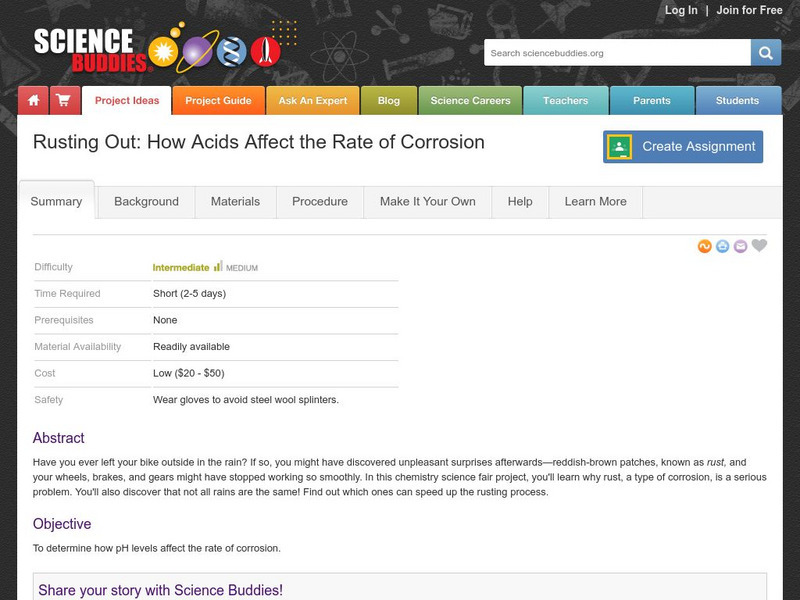Hi, what do you want to do?
Teach Engineering
How Can We Prevent the Corrosion Crisis?
Contemplate the causes of corrosion. An interesting lesson has learners first conduct an experiment where they place nails in different types of water. Based on the results, they consider how corrosion occurs and how engineers need to...
Cornell University
What Is Rust?
Why do metals rust differently? Scholars experiment with metal combinations in a hands-on activity. They create unique environments with different metals and compare the rate and amount of rust for each.
Curated OER
Oxidation: Does Iron Burn?
Searching for a fairly easy demonstration of how oxidation triggers rust formation? The demonstration allows high school chemists to witness the rusting of metals, as large and small objects are held into a flame while triggering the...
Curated OER
Nailing Rust
When your upper elementary or middle school class is learning about chemical changes, these activities help demonstrate the concepts. In Part A, they submerge and place a nail partially underwater, then after a week they make...
Curated OER
Oxidation
For an introductory physical class, you can use these vivid activities to introduce learners to chemical reactions. Spontaneous combustion, melting and burning, tarnishing and rusting all are evidence that a chemical reaction has...
Curated OER
Module 5 Revision Guide - Chemistry
If you use this as an outline for your chemistry lecture on metals, your young chemists will absorb a well-rounded overview. This is not a worksheet per se, but a useful summary of the behavior of metals. Save yourself some planning and...
Curated OER
Factors Which Affect Corrosion
Students investigate the factors which affect corrosion. In this corrosion lesson plan, students experiment with 2 nails, copper wire and magnesium ribbon placed in a petri dish of agar solution, potassium ferricyanate and an indicator....
Curated OER
Rusting-A Form of Oxidation
Students conduct an experiment to observe oxidation. In this chemistry lesson plan, students explain how rusting happens. They rank metals according to their conductivity.
Curated OER
Rusting, Burning and Oxygen
In this rusting, burning and oxygen worksheet, learners read about chemical reactions and are given diagrams of a rusting bicycle, a burning candle, and a variety of chemical changes. Students make observations and explain the chemical...
Curated OER
Rocks and Minerals
Students are able to describe earth processes (e.g., rusting, weathering, erosion) that have affected selected physical features in students, neighborhoods. They are able to identify various earth structures (e.g., mountains, faults,...
Curated OER
What's Eating Titanic?
Young scholars, in groups, research the bio deterioration of the Titanic. They write a report focusing on the rusting of the Titanic and estimate the amount of time it will take for the Titanic's bow section to completely dissolve.
Curated OER
Forest Management ~ Diseases and Pests that Effect a Good Harvest Stand
The forestry presentation found here lists and describes a variety of tree diseases. A few unappetizing photos are included to show symptoms of some of these diseases, or the insects and fungi that cause them. If you have a class that is...
Curated OER
Rusting and Metal Corrosion Part 1
In this chemistry instructional activity, students answer 18 multiple choice questions on rusting and metal corrosion. They select the answers from the drop down box.
Curated OER
Rusting-A Form of Oxidation
Students observe the rusting process in the lab. In this chemistry lesson, students rank metals according to their conductivity. They give real world applications of this activity.
Curated OER
Corrosion & Rust
Students examine how and when rust and corrosion occur. For this corrosion lesson students complete an experiment to see why metals rust.
Curated OER
Rusting as a Chemical Reaction
High schoolers participate in a hands-on activity in which they observe conditions that are most conducive to the rusting of iron. They set up an experiment with 8 different nails in different situations with one of them acting as a...
Curated OER
What Will Rust?
Students discuss if they have ever seen anything that has rusted. They place metal objects into the cup and then add just enough water to cover the bottom of the container. They complete information on their data sheets and record as...
Curated OER
Oxidation And Corrosion
Students sort tarnished metals by type and experiment with different cleaning solutions and techniques to restore them to their natural color and shine.
Curated OER
Rusting: A Form of Oxidation
Students observe and record the corrosive nature of oxidation-reduction reactions, and determine the electro-chemical series of selected metals.
PBS
Pbs Learning Media: Atmospheric Oxygen
In this feature, adapted from Interactive NOVA: Earth, students explore the relationship between oxygen concentration and the well-being of various organisms by simulating a change in oxygen levels and observing what happens.
Science Buddies
Science Buddies: Project Ideas: How Acids Affect the Rate of Corrosion
In this chemistry science fair project, students will investigate how pH levels affect the rate of a common form of corrosion, called rusting. The Science Buddies project ideas are set up consistently beginning with an abstract,...
Science Buddies
Science Buddies: Which Metal Is the Most Resistant to Corrosion?
Here's a practical engineering challenge: you need to build an enclosure for your dogs, using material that they can't chew through. It's going to be a lot of work to build, so you want to do it right. What material should you choose for...
Other
Rms Titanic: Titanic Science: The Story of the Titanic [Pdf]
An activity guide for exploring the science of the Titanic. Learn about principles of shipbuilding, how the Titanic sank, wireless radio, the accuracy of survivors' stories with respect to what really happened, and artifact conservation.
Careers New Zealand
Kiwi Careers: Metallurgist
This site contains information on becoming a Metallurgist in New Zealand. While some of the information is specific to New Zealand, most of it is uniform to the career.


























